Apples are considered one of the healthiest and at the same time affordable fruits. They do not contain the entire set of vitamins, but they are a successful combination.
At the same time, apples are not good for everyone, and in some cases they even have contraindications.
Svetlana Kuprina, a therapist at INVITRO , told us who shouldn’t eat apples and what danger they pose.
The most useful
Green apples are considered the most useful.
Allergic reactions to their use occur less frequently; they contain more malic acid, which improves digestion.

They also contain more vitamin C and have a lower glycemic index.
When you can't eat apples
1. If apples cause allergies.
2. During exacerbations of diseases such as gastritis, colitis, peptic ulcer, cholecystitis, etc.
3. If you have high glucose levels or diabetes. In these cases, it is recommended to avoid red and yellow apples.
Dangerous apples
The doctor recommends paying special attention to the appearance of the fruit and its origin.
The healthiest varieties of apples are local ones. All imported fruits are treated with chemicals to extend their shelf life.
Apples with dents and cracks on the surface can be dangerous. Intestinal infections and fungi can multiply in them, which can eventually lead to poisoning.
But the most serious danger is posed by apples with penicillium rot. They accumulate the toxin patulin.
It has a mutagenic and genotoxic effect and is preserved during processing (in juices, jams, purees, etc.).
You also need to remember to stick to the norm of apple consumption (no more than 2 per day), since the pectin they contain can cause an imbalance of microflora, fermentation and flatulence.








